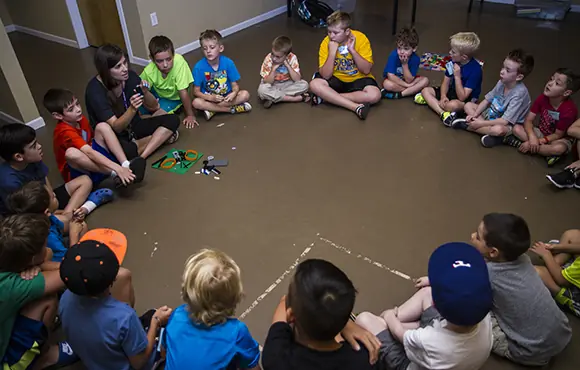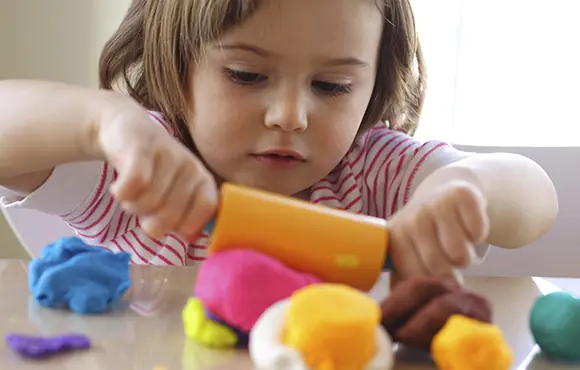Andrew continues to hum "The Imperial March" as his droid battle tank approaches the enemy. In his mind, his opponent's defeat is imminent. It's day three of Play-Well TEKnologies Jedi Engineering Camp, in Colleyville, Texas.
Andrew is one of 22 boys who participated in the Star Wars themed Lego Camp, where the week was dedicated to teaching STEM skills through playing with Legos.
"They're such weird, tiny humans. A lot of what we do, we learn from them," says Sara Cox, lead instructor for the camp, who has been working with kids for six years and began her job at Play-Well in February.
Each day of camp consists of a quick 10-minute warm-up and two projects. But today is special. Today the kids prepare for battle. Instead of two projects, kids spend the first half of class building a Droid Battle Tank and the second half battling one another for glory.
"On Monday they walk in crying because they don't know any of the pieces," Cox says. "But by Friday they have complete confidence in what they are doing."
These boys are just a few of the 400,000 kids who attended a camp this summer through Play-Well, a company that has been educating for 18 years and provides camps in 24 states.
After a quick demonstration of the Droid Battle Tank build, the kids go to work. They reach in to giant tubs filled with Legos, wheels, gears and chassis and quickly shuffle to find their own workspace on the floor.
Behind what may seem like a simple Lego build lies the complexities of engineering. The Droid Battle Tank features a worm gear drive that utilizes 90-degree gear meshing. According to Cox, this worm gear, often used on larger vehicles like Jeeps and Hummers, decreases speed while increasing torque.
"Our concepts and lessons build off of each other. The previous day we made a project that introduced transmissions and gear meshing, so Wednesday's lesson expanded on those concepts," she says. "Our goal with any lesson is to get the kids thinking about the inner workings of everything around them."?
Each day the children learn three new engineering concepts, which Cox quizzes them on at the end of each lesson. But the educational benefits are just one of the reasons Lenand Martin enrolls his son Brody in the camp.
Not only can Legos become an expensive hobby, but he believes it's harder to keep Brody interested in these activities at home without the social interaction and specific tasks the camp provides.
"Legos, when you build like this, it's really fun," he says. "But at home, they get bored with it after 10 to 15 minutes."
Camps are offered for boys and girls between 5 and 12 years old. While this camp had an all male roster, Play-Well has been pushing for more enrollments of young girls.
Play-Well has been working these efforts from the top down by hiring more female instructors. Cox and her instructor-in-training, Cailynn Ponciroli, are the two instructors teaching the camp this week.
"The biggest problem with getting girls in these classes is they worry, 'Am I going to be the only girl?'" she says.
While the push for more girls continues, the amount of engineering camps offered is continuing to grow. Dallas-Ft. Worth area manager for Play-Well Duy Nguyen says camps have grown from 100 kids a week to 700 in the two years he has worked there.
Nguyen credits Play-Well's rise in popularity to their Lego kits, the aspect that sets them apart from similar companies like Bricks 4 Kids and Mad Science. According to Nquyen, these kits – valued between $10,000 and $20,000 with up to 200 pounds of Legos – paired with their database of more than one million projects allows for customizable learning for each child.
"We can cater to the children's needs as a group and also a child's individual needs," he says. "The beauty of Legos is they get to individualize their own project. It's not just about going from point A to point B. There is total freedom to build what you want."
Play-Well summer camps last one week and cost between $125 and $200. Engineering-inspired Lego classes are also offered during the school year as an after-school program. Classes cost $16 per class and last from six weeks to the entire school year.
The dust has settled from the battles and Cox sits with the boys breaking apart sushi zushis (lego bricks that are stuck together) as they wait for parents to arrive. It's one of the many ways the camp leaders encourage the kids to keep things organized. She says she hopes the kids learn to look at the world around them a little differently after attending the camp.
"I hope they learn to question how and why things work the way they do. I hope they learn to have confidence in themselves and their own abilities," she says. "And most of all, I hope that they learn engineers can come in all different shapes and sizes."
A Day at Jedi Engineering Camp
1 of 11
Sara Cox, instructor for Play-Well Tek, gathers the 22 boys in her Jedi Master Engineering Camp in a circle and explains the day's lesson. Cox is one of two female instructors at the camp, and has been working with Play-Well Tek since February.
A Day at Jedi Engineering Camp
2 of 11
A group of boys reach into plastic tubs for materials needed to complete the day's Lego build. The students were tasked with building a Droid Battle Tank this day.
A Day at Jedi Engineering Camp
3 of 11
A tub of Jedi-themed Lego pieces. Play-Well takes up to 200 pounds of Legos to each camp in kits that are valued between $10,000 and $20,000.
A Day at Jedi Engineering Camp
4 of 11
Bennett kneels on the floor working on his Droid Battle Tank. Children in these camps are encouraged to customize their projects with their own ideas.
A Day at Jedi Engineering Camp
5 of 11
Maddox looks in shock as Colin drives his Droid Battle Tank up his arm.
A Day at Jedi Engineering Camp
6 of 11
A group of boys practice battling one another.
A Day at Jedi Engineering
7 of 11
Jack smiles as he test-drives his battle tank.
A Day at Jedi Engineering Camp
8 of 11
Jackson attempts to drive his tank up steep inclines he made from Lego grids.
A Day at Jedi Engineering Camp
9 of 11
Star Wars-themed Lego characters sit in a plastic tub. After mastering the basic build, the children are rewarded with these pieces for every 20 upgrades they made to the original design.
A Day at Jedi Engineering Camp
10 of 11
One of the young boys watches two Droid Battle Tanks compete as part of the final battle of the day.







Discuss This Article